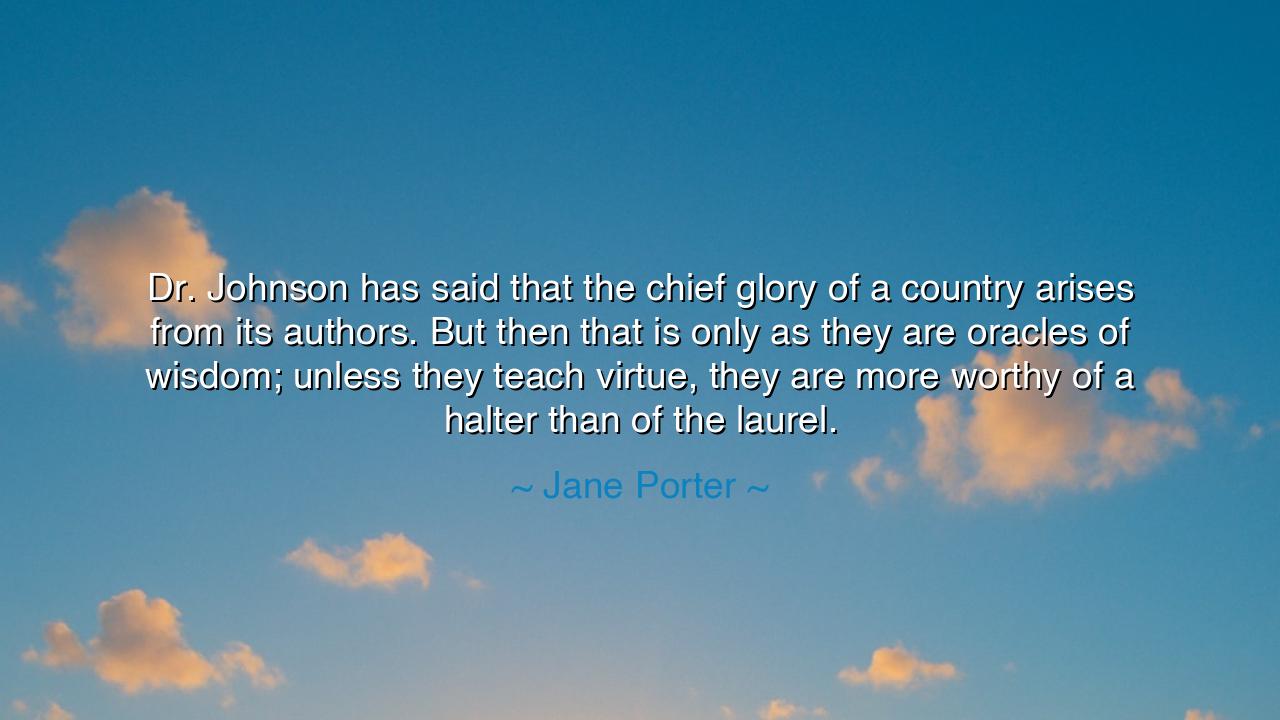
Dr. Johnson has said that the chief glory of a country arises
Dr. Johnson has said that the chief glory of a country arises from its authors. But then that is only as they are oracles of wisdom; unless they teach virtue, they are more worthy of a halter than of the laurel.






Jane Porter, with the fervor of a soul attuned to truth, reminds us that the chief glory of a country is not in its palaces, nor in its armies, nor in its treasures of gold, but in the living flame of its authors. For what is the wealth of empires if their spirit be barren? The written word endures when stone crumbles and banners fall to dust. Yet, she warns with equal force that the crown of literature is not merely for charm or delight; it belongs only when the author becomes an oracle of wisdom, guiding men and women toward virtue and justice.
The laurel wreath, emblem of triumph, was once laid upon the brows of poets who stirred nations to nobility. But Porter declares that if their words serve only to corrupt, to flatter vice, or to amuse the foolish while ignoring truth, then such writers are more deserving of the halter—the rope of shame—than of immortal honor. This is no light judgment; it is a fiery law, spoken to awaken future generations to discernment: not all who write are worthy, and not all glory is true.
Consider the tale of Socrates, who never penned a book, yet through the words of Plato became a teacher of nations. His teachings shaped Athens long after its armies fell, and his virtue was such that even his death became a lesson of courage. Contrast this with those writers who pandered to tyrants—whose tongues gilded injustice and whose words lent power to cruelty. History remembers them, but it does not honor them; their legacy is not wisdom but warning.
So too, in more recent times, one may look to the writings of Harriet Beecher Stowe. With her pen she exposed the wickedness of slavery, stirring hearts across oceans. Her book was not mere entertainment; it was a weapon of righteousness. In her, the laurel was deserved, for she proved that the might of a pen is greater than the sword when it lifts humanity toward freedom.
Therefore, let all who take up the pen tremble, for they wield a power that shapes nations. Let their words be vessels of light, not shadows of deceit. And let the people, when they crown their writers, look not to their eloquence alone, but to the virtue they teach. For the glory of a country is measured not by the number of its books, but by the truth and justice those books awaken in the souls of its children.






TNNguyen Thao Ngan
I’m intrigued by the contrast Porter draws between glory and punishment, suggesting that authors who lack virtue are deserving of a ‘halter.’ It makes me question the role of ethics in creative work. Should the measure of a writer’s success be the impact on readers’ character, or is intellectual stimulation enough? Perhaps true greatness combines literary talent with moral insight, but that balance seems rare and challenging to achieve.
N120. Thanh Nhu 11A1
This quote makes me reflect on the power of the written word. Porter emphasizes that authors are not merely entertainers but potential guides for public conscience. It raises an important question: can writers shape virtue, or only reflect it? And if they fail in this moral duty, what consequences should they face? It’s a provocative idea that literature has both cultural and ethical weight beyond mere fame.
LTLoi Luong Thi
What strikes me is the idea that glory without virtue can be harmful, almost criminal. This reminds me of modern celebrity culture, where influence is often disconnected from wisdom. I’d like to explore whether authors today are more accountable to moral standards or simply to popular opinion. Is the ‘laurel’ of literary success meaningful if it does not contribute to the betterment of society?
HTNguyen Hoai Trong
I find this statement both inspiring and intimidating. It raises a question about the purpose of art and literature: must every writer strive to teach virtue, or is the reflection of human complexity enough? Porter seems to argue that fame without moral guidance is dangerous. How do we balance admiration for literary talent with the ethical responsibility writers might carry for shaping society?
BTBich Tram
This quote makes me think about the moral responsibility of writers and intellectuals. Jane Porter suggests that authors gain glory only if they impart wisdom or virtue. I wonder how this applies in today’s world where writers can achieve fame without necessarily promoting ethical insight. Should authors be judged primarily by the moral impact of their work, or is literary skill and creativity sufficient on its own?